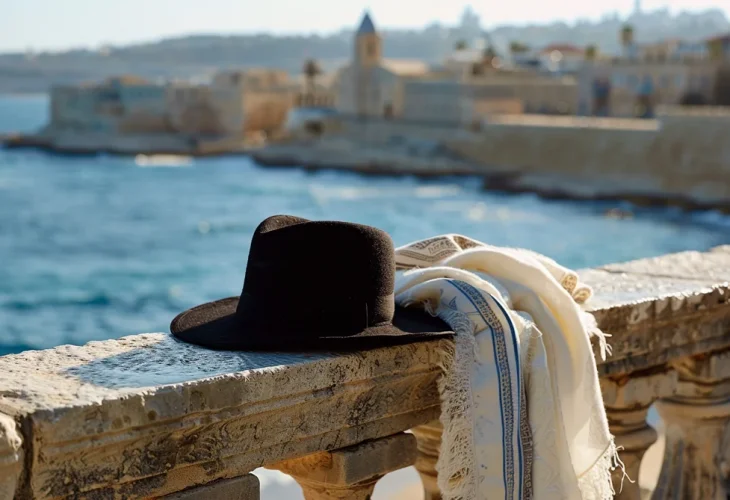Torah Personalities
When a Rebbe Almost Left the Holy Land: A Turning Point for Israeli Religious Life
In 1963, the revered Rebbe of Klausenburg threatened to leave Israel due to religious persecution—until the nation came to a standstill

A Rebbe’s Shocking Announcement
In the Hebrew month of Tishrei, 5724 (October 1963), the religious world in Israel was rocked by an unexpected announcement: the Klausenburger Rebbe, Rabbi Yekutiel Yehudah Halberstam, declared that he would be leaving the Holy Land. During the High Holidays, his followers in Kiryat Sanz had already sensed that something was troubling him deeply. He appeared visibly shaken during prayer and seemed burdened by a heavy decision.
Shortly after the holidays, the Rebbe informed his secretary, Rabbi Yosef Widenbaum, that he could no longer remain in the Land of Israel. Citing a deteriorating religious climate, persecution of Torah observance, and relentless media incitement against the religious community, he announced plans to relocate to the United States within the week. Panic spread among his followers, many of whom gathered outside his home in protest and anguish.
The Rebbe, dignified and resolute, appeared on his balcony and silenced the crowd with his commanding presence. “This is my decision,” he said. “I survived the Nazi inferno to spread Torah and Judaism. But if I am prevented from doing so in the Holy Land, I am pained to say I must return to exile.”
A Holocaust Survivor and Heroic Spiritual Leader
Rabbi Yekutiel Yehudah Halberstam was a towering spiritual figure and a living symbol of strength and devotion. At the age of 14, he was ordained by the renowned Galician scholar Rabbi Meir Arik. By 21, he had become the rabbi and head of the yeshivah in Klausenburg, Hungary. During the Nazi invasion, despite having opportunities to escape, he chose to remain with his followers. He was deported to Auschwitz with his wife and eleven children; only he survived.
Even in the brutal conditions of the camps, the Rebbe maintained his religious standards: he kept kosher, observed Shabbat, organized prayer groups, and refused to shave his beard. He even altered his prison uniform to align with Hasidic custom, buttoning the right side over the left.
After the war, he wasted no time in rebuilding Jewish life. He founded Torah institutions in the United States, including yeshivot in Montreal and Williamsburg, and raised funds for Holocaust survivors devoted to Torah. His initiatives extended to Israel, where he established schools in Tzfat, Be’er Sheva, and Kfar Azar. He remarried and was blessed with seven more children.
Eventually, the Rebbe immigrated to Israel and founded Kiryat Sanz in Netanya. There, he fulfilled a personal vow he had made while fleeing a Nazi death march: if he survived, he would dedicate himself to healing the sick. True to his word, he built a hospital in the new community, thus honoring both his commitment and his vision for a Torah-anchored future in Israel.
A National Uproar and a Change of Heart
By 1963, however, the Rebbe felt that his mission was being obstructed. “I don’t want my children and students to feel fear when performing mitzvot (commandments), like we did in Europe,” explained his secretary to the press. “In America, one can observe the Torah openly and without fear.”
The announcement sent shockwaves through the country. Even government leaders grew alarmed at the international implications: what would the world think if a leading religious figure left Israel due to religious oppression?
Moshe Sharett, then head of the Jewish Agency and later Prime Minister, reached out and urged the Rebbe to reconsider. Minister of Religious Affairs Zerach Warhaftig visited him personally. Netanya’s mayor and Israel’s chief rabbis all pleaded with the Rebbe. Rabbi Yosef Shlomo Kahaneman, the Rosh Yeshiva of Ponovezh, even traveled to Netanya to try to dissuade him.
Ultimately, after a practical meeting with Jewish Agency leaders, the Rebbe received a series of assurances: increased protection for Torah-observant Jews, intervention against Christian missionary efforts, and a reduction in the harsh anti-religious tone of the media. Additionally, the Rebbe requested the establishment of a rabbinical union to defend Jewish values, an initiative that was swiftly implemented.
Only after these conditions were met did the Rebbe agree to stay.
Legacy of Strength and Vision
The Klausenburger Rebbe remained in Israel for many more years, continuing to lead his community in Kiryat Sanz with unwavering dedication. His decision to stay, after nearly leaving, underscored his deep commitment to the Jewish people in the Land of Israel, even as he demanded that the country live up to its spiritual promise.
His life was a testament to courage, resilience, and unwavering faith.

